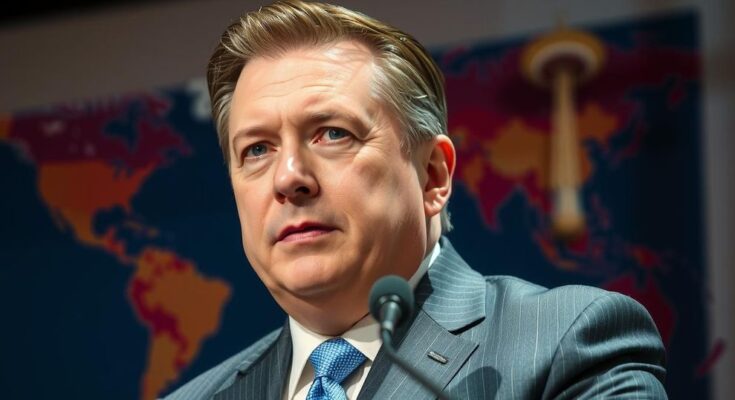Elon Musk has recently engaged in global politics, notably endorsing the AfD party in Germany and implying support for UK populism. His controversial statements and political contributions, especially in the United States, reveal his significant influence on democratic processes. With actions that span multiple countries, Musk’s involvement raises important questions about the relationship between wealth and political power.
Billionaire Elon Musk has increasingly influenced global politics, notably endorsing the far-right Alternative for Germany (AfD) party just weeks prior to the country’s federal elections. He expressed this support through an op-ed in a German publication, aligning the AfD’s views on economic recovery and migration with his success at Tesla and SpaceX. This endorsement has drawn criticism from German officials, accusing Musk of attempting to sway the electoral process. Furthermore, he is scheduled to engage in a live discussion with AfD leader Alice Weidel on his social media platform, X, on January 9.
Musk’s political engagements are not limited to Germany; he has also made waves in UK politics. A recent photograph showcased Musk with Nigel Farage, leader of Reform UK, igniting speculation of potential political contributions to Farage’s party. Despite prohibitions on foreign political donations, there are discussions regarding Musk’s capacity to contribute through X’s UK subsidiary. Additionally, Musk has stirred controversy by branding the UK as a “tyrannical police state,” a statement resulting in scrutiny regarding the influence of social media on civil unrest during the recent Southport riots.
In Italy, Musk was admonished by President Sergio Mattarella for his remarks suggesting judicial dismissals following a contentious ruling regarding a migration pact. The President emphasized Italy’s ability to manage its own affairs despite Musk’s assertions of its democratic integrity being compromised by the judiciary.
Musk has also faced backlash in Brazil, where his platform X was temporarily banned after he resisted a court ruling to remove accounts associated with hate speech and misinformation, leading to protests from supporters of former President Bolsonaro who perceived the action as political persecution. Following payment of fines, the ban was lifted.
In the United States, Musk remains active in political financing, reportedly contributing approximately $200 million to support Trump’s re-election efforts. His engagements have raised questions about the implications of his wealth and position on the political landscape as he has incentivized voters in swing states with monetary rewards related to constitutional rights. Additionally, he has sought to influence governmental efficiency via the newly formed Department of Government Efficiency (DOGE), further highlighting the intricate connection between private interests and public governance.
Overall, Musk’s active involvement in various political matters across continents underscores his significant influence. His comments and actions provoke discussions about the intersection of wealth, power, and democracy in contemporary society, often leading to controversial debates and responses from political officials globally.
Elon Musk, known for his entrepreneurial ventures, has become an outspoken figure in global politics, particularly in Europe and the United States. His endorsements and remarks have prompted debates regarding his influence over political processes and the implications of foreign involvement in elections. The article discusses Musk’s recent controversies, including his endorsement of Germany’s AfD party, interactions with UK politicians, statements regarding the Italian judiciary, challenges in Brazil regarding content moderation, and extensive political contributions in the United States, illustrating the breadth of his influence.
Elon Musk’s foray into global politics, characterized by endorsements, controversial statements, and substantial financial contributions, raises critical questions regarding the impact of wealth on political systems. His engagements in various countries, from Germany to the United States, serve as a testament to his ability to sway political discourse and influence public opinion. As he navigates these complex political landscapes, the repercussions of his actions on democracy and governance will continue to be scrutinized.
Original Source: www.euronews.com




